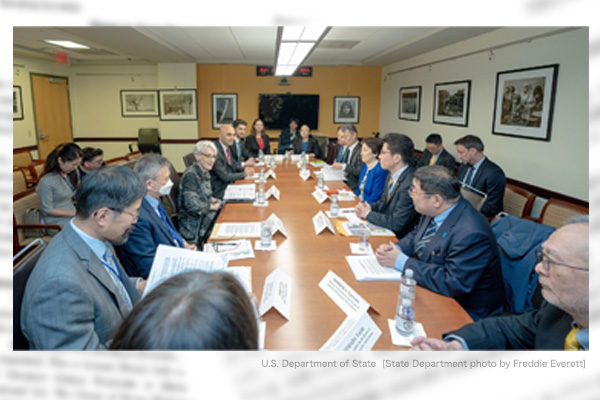In early May, a delegation from the Association of the Families of Victims Kidnapped by North Korea, its supporting organization and a supra-partisan parliamentary league on the abduction issue visited the United States for the first time in four years. I joined the delegation as the chairman of the supporting organization. The main purpose of the visit was to gain U.S. understanding about and support for our new policy of “not opposing” humanitarian aid to North Korea “if all Japanese abductees return home together while their parents are alive.” I believe the purpose was accomplished.
Seeking to resolve two humanitarian issues simultaneously
In February 2019, then U.S. President Donald Trump directly conveyed Japanese Prime Minister Shinzo Abe’s message for the resolution of the abduction issue to North Korean leader Kim Jong Un and got a positive response from Kim, a senior Trump administration official told us during our previous visit in May 2019. However, the abduction issue failed to make progress due to a breakup in Trump-Kim talks over the North Korean nuclear problem.
Under the U.S. Biden administration, Washington-Pyongyang dialogues have been completely shut down, and the Kim regime has deployed nuclear missiles and repeated missile firing drills. In such situation, the Abe-Trump strategy to resolve the abduction issue through U.S.-North Korea nuclear talks cannot work.
In the meantime, North Korea has been plagued with serious food shortages due to tough international economic sanctions and the closure of its border with China related to the COVID-19 pandemic. North Korea has requested China for massive food aid since last autumn, but the request has been rejected by Beijing.
In consideration of the situation, the Association of the Families and the supporting organization adopted a new policy in February that urges the Kim regime to resolve the two humanitarian issues simultaneously: a time-sensitive humanitarian issue of returning not only Japanese-government-identified abductees but all abductees together, and a humanitarian issue of food shortages in North Korea.
The new policy will not work if the Kim regime judges the U.S. may oppose Japan’s contact with North Korea in the absence of U.S.-North Korea nuclear talks. In addition to that, although humanitarian aid does not violate United Nations sanctions on North Korea, it is indispensable to explain the new policy and get understanding about and support for the policy from the U.S. that has provided massive support for Japan’s efforts to resolve the abduction issue.
Deputy Secretary of State promised full support
Senior U.S. government officials who listened to our explanation and indicated their understanding about the new policy include National Security Council Coordinator for the Indo-Pacific Kurt Campbell, Deputy Secretary of State Wendy Sherman, the assistant secretary of state in charge of North Korea, the deputy assistant secretary of state for human rights and Under Secretary of the Treasury Brian Nelson. Wearing a blue-ribbon badge symbolizing movements to rescue Japanese abductees, Sherman offered to do all what she can to support us.
Lawmakers who also offered understanding about and support for the new policy include Republican Senators Dan Sullivan, Ted Cruz and Bill Hagerty (a former ambassador to Japan), as well as Republican Representative Larry Bucshon.
We also held meetings with North Korea experts outside government. One of them offered to support the new policy, saying, “As Japan has imposed the world’s toughest sanctions on North Korea because of the abduction issue, lifting the tougher part of sanctions than international level when all Japanese abductees return home will not be opposed by any country or any human rights activist in the world.”
Tsutomu Nishioka is a senior fellow and a Planning Committee member at the Japan Institute for National Fundamentals and a visiting professor at Reitaku University. He covers South and North Koreas.


